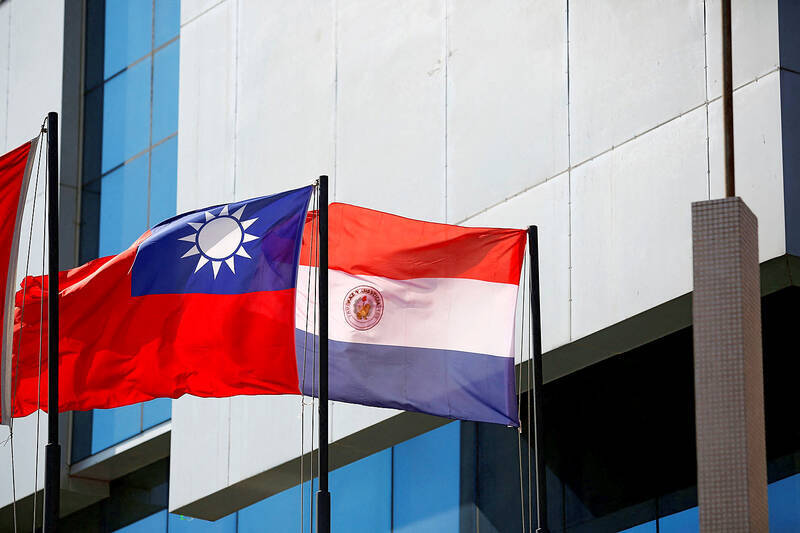Taiwan yesterday began offering preferential tariffs on 19 products imported from Paraguay in line with a resolution signed in August last year as part of the Economic Cooperation Agreement (ECA) between the two countries, the Ministry of Economic Affairs said.
Resolution No. 8 of the ECA allows for zero tariffs on 17 Paraguayan goods, including frozen boneless pork, preserved chopped beef offal, wheat powder, industrial-use alcohol and textiles, the ministry said.
Tariffs on Paraguayan-made rice crackers were also reduced to 10 percent, while natural honey would see a tariff reduction to 20 percent over the next three years, it said.

Photo: Reuters
Since 2017, Taiwan has imported US$45.44 million of the 19 goods, with frozen boneless pork being the leading import among them, the ministry said.
The ECA officially took effect on Feb. 28, 2018, and has since led to several productive joint meetings, it said.
To implement the terms of Resolution No. 8, the Executive Yuan in November last year approved an amendment to customs import tariff regulations, as proposed by the Ministry of Finance.
Paraguay is one of the nation’s key diplomatic allies in South America and has consistently voiced support for Taiwan’s participation in international affairs, the economic ministry said.
The South American country is also recognized for its stable economy and growing competitiveness in the global livestock market, with ongoing efforts to modernize industries and attract investment, it said.
The new preferential tariffs would enhance bilateral trade, particularly as Paraguay specializes in agricultural exports, the economic ministry said.
The agreement is expected to create new economic and business opportunities for both nations, it said.
From the time the ECA was launched until last year, bilateral trade between Taiwan and Paraguay has grown by 300 percent, it said.
Paraguayan frozen beef has become a significant source of beef for Taiwan, while Taiwanese exports of hand tools, plastic products and auto parts to Paraguay have increased by 27 percent, it added.

Taiwanese can file complaints with the Tourism Administration to report travel agencies if their activities caused termination of a person’s citizenship, Mainland Affairs Council Minister Chiu Chui-cheng (邱垂正) said yesterday, after a podcaster highlighted a case in which a person’s citizenship was canceled for receiving a single-use Chinese passport to enter Russia. The council is aware of incidents in which people who signed up through Chinese travel agencies for tours of Russia were told they could obtain Russian visas and fast-track border clearance, Chiu told reporters on the sidelines of an event in Taipei. However, the travel agencies actually applied

Japanese footwear brand Onitsuka Tiger today issued a public apology and said it has suspended an employee amid allegations that the staff member discriminated against a Vietnamese customer at its Taipei 101 store. Posting on the social media platform Threads yesterday, a user said that an employee at the store said that “those shoes are very expensive” when her friend, who is a migrant worker from Vietnam, asked for assistance. The employee then ignored her until she asked again, to which she replied: "We don't have a size 37." The post had amassed nearly 26,000 likes and 916 comments as of this

New measures aimed at making Taiwan more attractive to foreign professionals came into effect this month, the National Development Council said yesterday. Among the changes, international students at Taiwanese universities would be able to work in Taiwan without a work permit in the two years after they graduate, explainer materials provided by the council said. In addition, foreign nationals who graduated from one of the world’s top 200 universities within the past five years can also apply for a two-year open work permit. Previously, those graduates would have needed to apply for a work permit using point-based criteria or have a Taiwanese company

The Shilin District Prosecutors’ Office yesterday indicted two Taiwanese and issued a wanted notice for Pete Liu (劉作虎), founder of Shenzhen-based smartphone manufacturer OnePlus Technology Co (萬普拉斯科技), for allegedly contravening the Act Governing Relations Between the People of the Taiwan Area and the Mainland Area (臺灣地區與大陸地區人民關係條例) by poaching 70 engineers in Taiwan. Liu allegedly traveled to Taiwan at the end of 2014 and met with a Taiwanese man surnamed Lin (林) to discuss establishing a mobile software research and development (R&D) team in Taiwan, prosecutors said. Without approval from the government, Lin, following Liu’s instructions, recruited more than 70 software